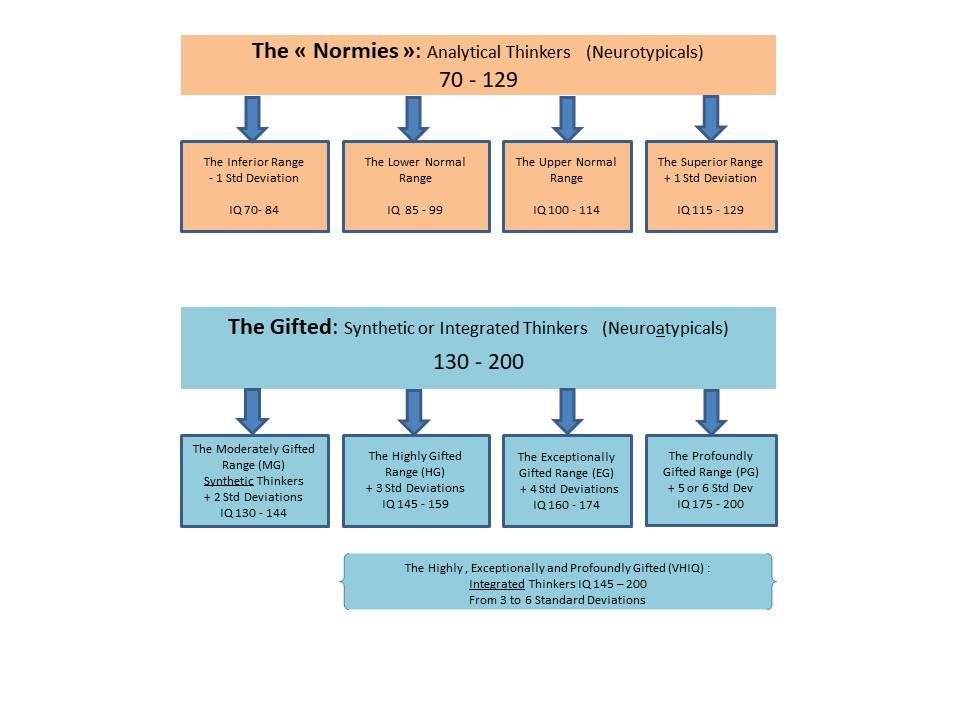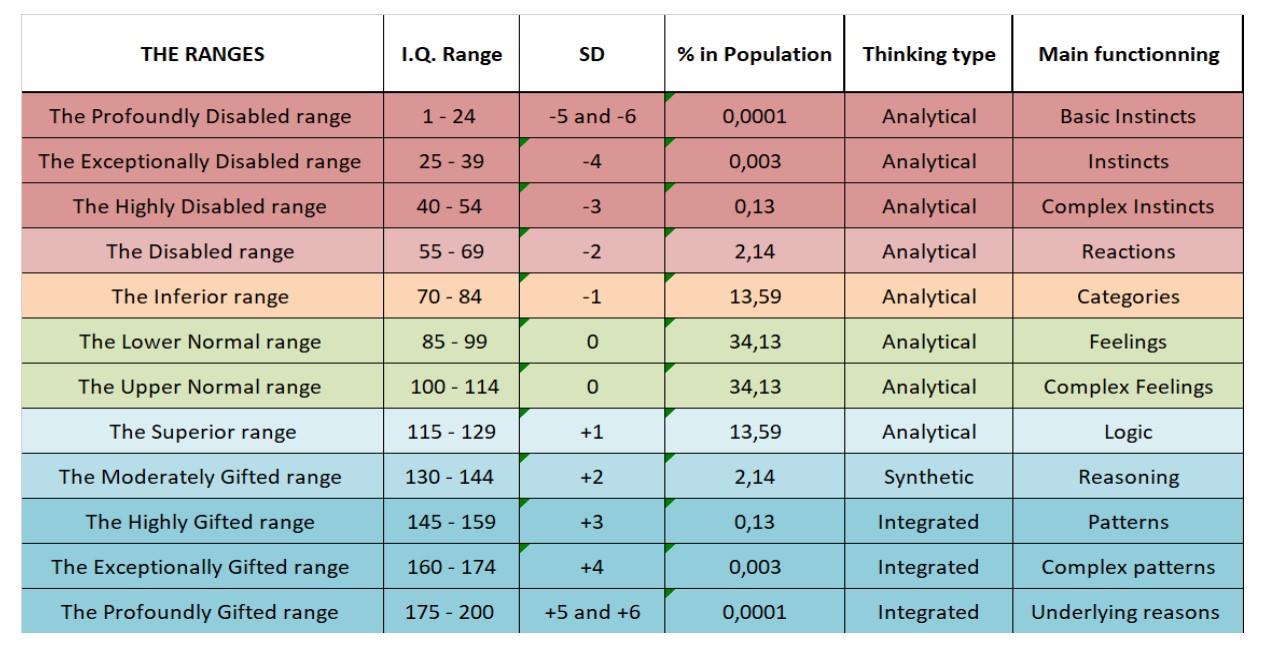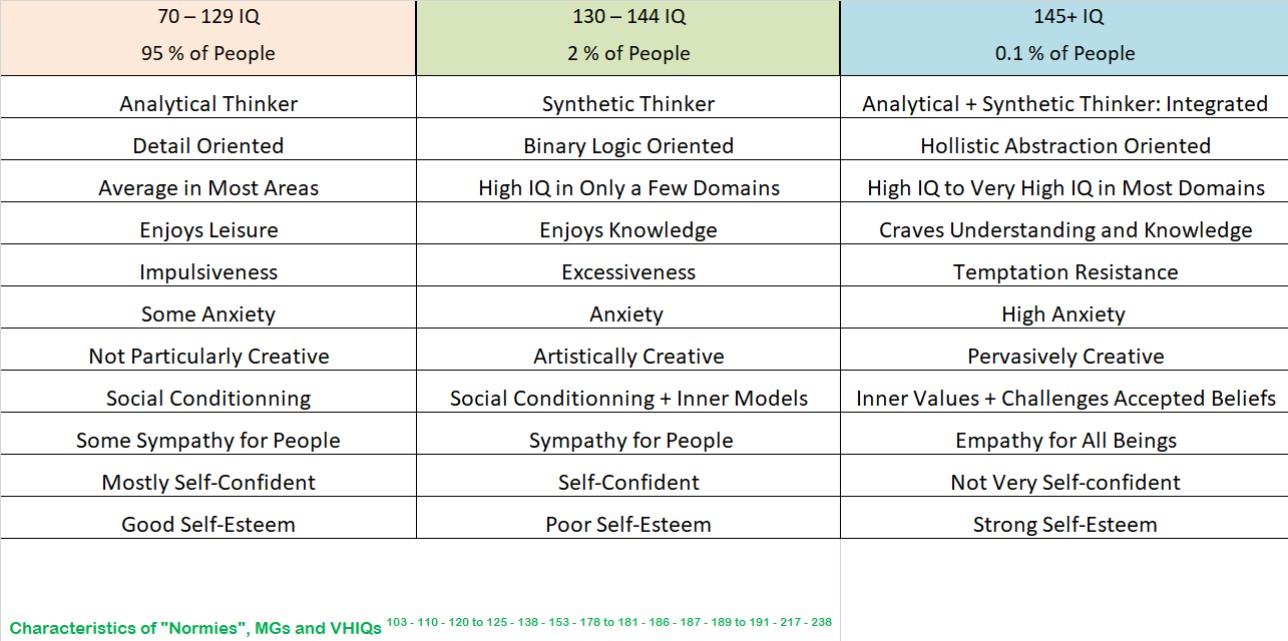world to the thinker.
Analytical thinking is equated to taking small logical steps to reach understanding.

The Moderately Gifted (HIQ: 130-144) are synthetic300-303: Synthetic thinking103is expanding
already known mainstream concepts as one acquires new information: From the thinker to the
world.
Synthetic thinking signifies taking large logical steps with a more global approach. It leads to
more creativity than for “Analyticals”.
The Very High I.Q. people (VHIQ: above 145) are both analytical and synthetic, they are
“integrated” thinkers316: Integrated thinking103 is creating the concept yourself from an early
age and comparing it to mainstream concepts when that knowledge is available: From the world
to the thinker, but at the same time, from the thinker to the world.
Integrated thinking means taking giant leaps of comprehensive reasoning. That mental capacity
leads to very intuitive and totally “outside of the box” thinking.
Brain functioning types 103-300-303-316

Thinking types and main brain functionning101-103-300-303-316-385
4. I.Q. and Personality
How can one measure intelligence all the while circumventing imperfect tools such as
standardized I.Q. tests? One way is to consider how intelligence consistently impacts one’s
behavior, emotions, needs…, as well as the type of deep-seated personality one exhibits.
In a nutshell, your intellectual aptitude affects your personality, and your personality represents a
specific intellectual profile.
In this book, I aim to establish the correlation between intelligence and the psychological
idiosyncrasies of each group of individuals from the Inferior Range to the Profoundly Gifted
Range.
The deepest differences between I.Q. ranges are connected to the magnitude of, structure or
concepts, one borrows from the world103, in a particular field of intelligence, as opposed to
innovative and self-reliant, reasoning. The highest subtype of intelligence influences all others
and is paramount in defining one's typical level of performance. That difference in I.Q. levels
bears consequences in the sorts of matters one is interested in, who one surrounds oneself with,
how sensitive or anxious one is164, how one relates to other people, etc.
Not only is that approach reasonably accurate, at least as much as a standardized I.Q. test would
be19, but it also gives the same result throughout one’s life, regardless of anxiety, fatigue,
learning disabilities, social phobia, depression, cognitive decline due to aging, etc. On the other
hand, I haven’t been able to evaluate it widely with people with autism, but while the first results
seem encouraging (the intellectual forces counterbalancing the lack of emotional strong points)
they are not as satisfying.
4.1 Personality Traits Involved in Intelligence
According to my observations, and those of cited researchers, the more intelligent a person is, the
more, at least to some extent, he, or she, is inclined to be:
1- Utilizing a different mental strategy103:
- A person whose intellectual functioning is more synthetic than analytic, and even more
integrated than synthetic.
- A person with an ability to detect and understand patterns.
2- Independent116-118 :
- Independent in their opinions and worldviews
- Uninfluenced by habitual outlooks forced upon by family or friends, not likely to follow into
other’s footsteps without adding a persistent individualized touch.
- Able to create their own concepts for understanding reality without relying on existing
structures or models.
3- A truth-seeker118:
Looking for truth in all matters, regardless of what the consensus may be among the intellectual
elite.
4- Intense in their behavior and predisposed to “overexcitabilities”108-109:
- Always mentally, physically, and emotionally excited.
- Attached to details.
- Often anxious and stressed-out for seemingly pointless reasons.
- Moved to tears by situations or art that would barely get the attention of most people.
- Highly organized to try to alleviate those “overexcitabilities”.
5- Highly intuitive118:
- Able to guess likely consequences of acts and decisions (one’s own or other’s).
- Able to understand situations and concepts, apparently out of nowhere, by using abilities
beyond the five senses.
6- Introspective119:
- Often wondering if one’s attitude is acceptable, if one's opinions hold ground
- Questioning if one should be more flexible, intelligent, open-minded, giving…
- Being prone to self-criticism.
7- Sympathetic/Empathetic118:
- Able to sense other people’s feelings or a slight difference in the atmosphere.
- Capable of identifying liars, knowing who is trustworthy or reading non-verbal cues.
- Tolerant of innocuous differences between people.
- Able to realize that someone may think, or act differently and still be respectable.
- Unwilling to force one’s opinion or views on other people.
8- Interested in or willing to learn118:
- Willing to study, mostly by oneself, cutting-edge, difficult, brainy topics that might solve
existential questions or important problems (such as astrophysics, quantum mechanics, medicine,
math, engineering, data-processing, etc.):
- Interested in several challenging subjects.
- Ready to invest time to acquire many aptitudes and knowledge across the board.
9- Introverted118-119:
- Socially awkward.
- Needing time to oneself.
- Never bored when alone.
- Not at ease in social situations because one’s interests and emotions don’t match others’.
- Not fully understood by one’s peers and family, feeling only a superficial connection
with everyone else.
- Insensitive to praise and flattery.
10- Resilient117-119 :
Resistant to life’s hardships because one’s strength originates from an inner vitality.
11- Creative119:
- Inventive.
- Interested in arts of many kinds.
- Moved by beauty.
- Feeling an inner urge to create, draw, paint, dance, play, cook, compose, and write in a very
personal and unique way. Besides, it is believed that 3 thresholds of creativity quality111 can be
noticed. They correspond to the 85, 100 and 120 I.Q. marks.
12- Adventurous117-119:
- Interested in discovering new concepts, in taking part in new experiences.
- Willing to adapt to new chosen situations.
- Having the need to explore, discover, or absorb knowledge through all senses.
- Ingenuous or naïve at times.
Note that anxiety can get in the way of adventurousness.
13- Goal118-119 oriented:
- Ready to pursue one’s goals even if poles apart from what society values such as finding a
spouse or a decent job.
- Prone to try to change the world (not only as an idealistic teenager but throughout the course of
one's life).
- Ready to take steps to pursue one’s passions or dreams.
- A tad provoking, willing to push people beyond what they want to achieve for their own good.
- A willing or unwilling leader in one’s strong domains.
- An Architect of many projects.
- Organized and inclined to long-term planning to reach one’s goals.
14- Following moral118 and ethical codes:
- Endowed with strong personal values.

- Honest and candid.
- Law-abiding (unless law appears unjust).
- Hardworking.
- Finding it hard to lie or to fool someone on purpose.
- Feeling the need to improve the world and people’s behavior by leading them towards a greater
good.
15- Showing robust memory118:
- Having a powerful long-term, and short-term memory.
- Able to recall tiny details of importance years later.
- Able to retrieve data or trivia everybody else has forgotten.
- Good at remembering numbers, faces, patterns, scents, tastes.
However, memory can be deficient from lack of interest or impeded by anxiety.
16- Cultured118:
- Showing interest and even competence in multiple fields.
- Aware of facts, retained over the years, even in domains one doesn’t especially enjoy (titles,
names, quantity, dates …) in history, literature, cinema, music, geography, popular culture, etc.
- Interested in arts and knowledge across many fields.
- Often passionate and knowledgeable about delicacies (fine cuisine, tea, fine wine, chocolate,
coffee, scents…).
- Fan of complex musical harmonies and melodies (classical, jazz, blues, folk) but also powerful
music (alternative, progressive, rock, heavy metal).
4.2 Intelligence Can Also Be Noticed in One’s Appearance
The higher the I.Q. rank the more androgynous111-112 the features, the behavior, and the
psychology with a heightened rate of sexual and gender ambiguity113. While people of average
intellect tend to be hyper-gendered, people on the far-right of the Gaussian Curve tend to have
more androgynous faces. Likewise, the higher the intelligence the more focused the attention and
the larger the pupil114-115 for the same age and the same lightning conditions.
4.3 The Advantages and the Drawbacks to a Psychological Approach
As uncovered in the preceding chapter, there is a progression of a selection of identifiable
personality traits in conjunction with the rise of intelligence. Therefore, assessing intelligence by
measuring the intensity of these comportments appears both conceivable and effective.
If two individuals, with the same acumen, display a different array of these traits, albeit with
various intensities, these characteristics will counterbalance one another so as to all merge into a
result resembling a global I.Q. score. The more wide-ranging and extended the assessment, the
more precise this result will be.
Apart from the complexity of explaining with precision, to the reader, the intuitive data, I have
collected over the years, regarding all the specifics I use to evaluate someone’s intelligence, the
drawbacks to this method are few and mostly related to an outsider’s viewpoint.
First off, the reader won’t be aware of his or her cognitive strengths and weaknesses among
abstract logic, verbal ability, mental rotation, fluid intelligence, crystallized intelligence79, etc.
Second of all, with this book, the reader, who scores him or herself, might misunderstand my
logic and estimate an incorrect score (guidelines are supplied to minimize this likelihood).
There will exist no tangible evidence of that score, except maybe in the inner sensation of having
finally discovered yourself. Therefore, entering high I.Q. societies or “gifted education”
programs, is out of the question, for, valid proof is required.
Last but not least, psychometricians will undoubtedly judge this approach to be worthless and
urge you to take a “real” official test.
The advantages in my opinion are many. I have already reviewed them a few paragraphs back
but would like to remind the reader with a quick summary.
The score found here will remain stable even if the test-taker is tired, anxious, stressed out, or
depressed. It will be accurate even in cases of bilingualism, cognitive impairments, or emotional
disorders. It takes all of the test-taker’s intelligence into account (not merely 70% of “g”). Unlike
regular tests, which are unreliable above 140, the score, provided at the end of this book, is
reasonably accurate from 90 to 160 (+/- 8 points for the 1st assessment; +/- 5 points for the 2nd
one, +/- 3 points for the 3rd one) and still gives a fairly good idea from 70 to 180.
This test can be taken many times without any loss of precision. You can assess yourself from all
over the world, provided your English is fluent and you’re an adult (younger personalities will
obtain unreliable results).
Last but not least, it won’t cost you a dime, only time and patience.
The second part of this book is based on the observation, verbal exchanges, and interactions with
many people from first-world countries, both in person and online over many years. It is not,
however, a statistically based scientific study with a fixed panel of subjects.
The people portrayed thereafter are merely aggregates of several existing individuals, members
of a particular range, whose names and life situations have been modified so as to be rendered
anonymous.
PLEASE READ:
I have compiled my observations about the psychology of people in every major range. While I
strive to remain as objective as possible, keep in mind that this outlook comes from a person
whose I.Q. belongs to the higher ranges and consequently regards lower and average ranges as
puzzling. I apologize in advance for any remark that might seem a tad condescending or
judgmental. I totally think that everyone, in this world, is important, in their own way,






